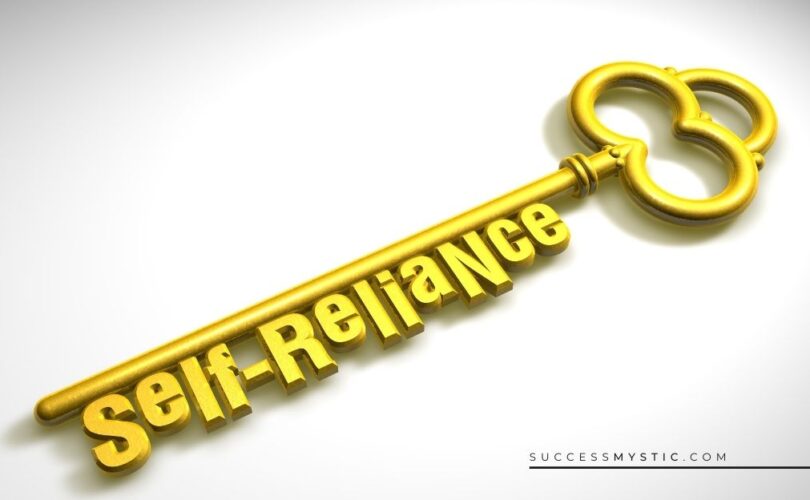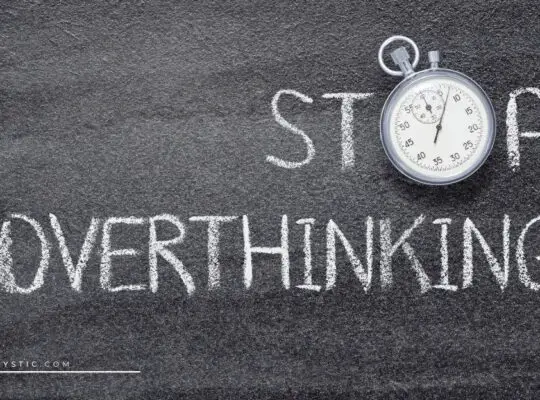Follow Your Own Instincts and Ideas – FOLLOW YOURSELF
Self-reliance. What is it?
What does that mean? In truth, it is part skill and part mindset. Both of those are things you can influence.
Self-reliance is a building block that is crucial to the strength of the foundation you lay. It’s all about developing the right mentality – a self-reliant one. Part of growing up and becoming an adult is looking after yourself, calling the shots, making decisions for yourself.
You really don’t realize just how much you rely on others to ensure your life is running smoothly until you’re completely on your own. That’s what your self-reliance is really put to the test.
Four Key Principles Required To Build Self-Reliance
As far as a self-reliant mentality goes, there are four key principles required to build self-reliance.
1| Take Responsibility
It’s up to you to assume responsibility for everything in your life. Once upon a time, you relied on a parent to wake you each morning for school. Now you set an alarm and depend on it to rouse you.
You should use a calendar to keep track of important dates and appointments. You have to pay your own bills, clean up after yourself, cook, and do the laundry.
These are the basics of self-reliance and if you struggle with those, then there is a good chance you struggle with the rest. You can’t blame your manager for your failure to launch at work.
You have to own up to the mistakes you make and take steps to fix the problem. You can’t run to others every time you run into trouble. Taking responsibility for your life, and everything therein is a vital aspect of self-reliance.
It’s not a lot of fun, it’s going to be frustrating, time-consuming, and tedious. However, it’s part of being a self-reliant adult. You won’t get pats on the back for it, nor will it end in praise. What it is, is satisfying.
With self-reliance comes confidence. It will make you feel more empowered. Instead of waiting for life to happen, you will feel in control of your own destiny. When you take responsibility for yourself, you open the door to bigger and better opportunities.
2| Stay Informed
To take responsibility, you have to stay informed and know how to do that. It’s easy to shrug life off and blame a lack of knowledge on your inaction. In cases like this, we often turn to someone else to make the difficult decisions. In truth, you never made any attempt to figure it out for yourself.
This is one of the weakest excuses you can make these days, especially considering the internet holds the answers to any and every question you might have. You don’t need to pawn things off on others or blame anyone for your lack of knowledge. It’s up to you to stay informed and seek out the information necessary for you to take responsibility in every situation.
It’s a natural impulse to turn to people you trust when you run into trouble. While there are times to ask for help, it’s equally as important that you inform yourself and take responsibility wherever possible.
Teach yourself, if you hit a wall while trying to take responsibility and stay informed, then you can reach out for help. Of course, if the stakes are particularly high, you can ask for help sooner.
Self-reliant people are always looking for opportunities to expand their skills and knowledge. They read books because they want to not because they’re forced to. They seek knowledge because they want to, not because someone else encourages them to.
They keep abreast of current events and are interested in talking to others. They are observant because all of that fuels their ability to solve problems and make decisions.
3| Know Your Path
Self-reliant people know where they’re going because they set goals for themselves. They don’t aim to achieve what others set out for them. Rather, they aim to be autonomous. They don’t rely on external validation.
They have an end goal in mind, and they use that to create their life’s blueprint. When problems arise, self-reliant people inform themselves and take responsibility by finding a resolution.
4| Make Decisions
A self-reliant person relies on their ability to make decisions for themselves. Life is less stressful when you are proactive in your decision-making. It can be easier to sit back and let life happen around you and to you.
This will only result in a bigger problem and more difficult decisions, especially if you avoid them. Making decisions proactively is a habit of the self-reliant and it’s one you should adopt.
Take The Time To Build Self-Reliance
It takes time to learn self-reliance, you’re not going to magically become a wise sage. It is something that you can develop and the more experience you have, the better you become at independence. That is if you are following your instincts and ideas. You hear people saying that they always follow their gut, but what does that really mean? How can you follow your ideas? How can you stay true to your instincts?
First of all, let’s clarify what instinct is. It’s your immediate understanding or response to a situation. You don’t need to call someone to get a second opinion. You don’t need to think about it any longer. You instinctively know. It’s a feeling that only you can feel and it’s personal so others can’t weigh in on it accurately or appropriately.
Following your instincts or intuition is the ultimate expression of self-trust. Following your gut is the key to avoiding unhealthy situations, relationships, and people. You’re going to run into a lot of those throughout your life and it’s important that you’re in touch with your instincts. We can’t always rely on others to steer us in the right direction because we can never truly know their intentions.
It isn’t just as simple as trusting your gut, though. Life is more complicated than that and we often have circumstances or habits drawing us in the opposite direction of our gut. Your instincts are still there, but we aren’t in touch with it enough to hear it or listen. You can carve a clear path to get in touch with your instincts and ideas and rely on yourself throughout life.
Think of your instincts as your compass. There are all different kinds of things that can interfere with the effectiveness of a compass. When you’re aware of the obstructions, then it’s easier to correct your path as necessary.
Obstacles To Your Instincts
In terms of obstacles to your instincts, this is what you need to look out for.
Overthinking
It makes sense that overthinking would be one of the biggest obstructions to the compass that is your instincts. When you put excessive thought into all of your decisions, then as you cycle through an endless number of scenarios you are moving yourself further and further from your instincts.
This is particularly true when you are trying to justify certain behavior or rationalize a particular decision. Sometimes we do this to create an agenda to cater to a decision we’ve already made. Or, to build a case for something we really want and know isn’t the right choice. This can overwhelm your instincts and result in analysis paralysis.
Should
When you overthink things the shoulds start to creep in. The shoulds also end to appear when you’re focused on the external. For example, you start to think about what you should do when you think about how others will perceive your decision.
This invites the expectations, rules, and preferences of others to cloud your instincts and ideas. When you find yourself saying should, you need to understand that you are moving away from your instincts.
Bias
Your unconscious biases are almost the opposite of overthinking, but despite that, they similarly impact your instincts. Rather than overthinking a situation, you’re making a snap judgment based on stereotypes, background information or previous experiences. This robs you of the opportunity to listen to your instincts.
Family & Friends
The people with the greatest power to override your instincts are the people who you love, respect, and whose approval you seek. This might be a parent, a sibling, spouse, manager, coach or just a close friend. They mean well, but their advice is moving you away from your instincts.
Yourself
When you really want something, it’s easy to ignore the red flags you see along the way. It might be that you’re striving for acceptance, status, love, a relationship or children. Your desire to get there can steer you off your chosen path. It robs you of your ability to follow your own ideas and get in touch with your true instincts.
Abuse or Trauma
Finally, if you have experienced abuse or trauma in your past, then this is a powerful culprit that steals your attention from your instincts. Trauma and abuse, particularly in your childhood, leaves a permanent impact. When you go through something like that it shades your ability to trust yourself.
Trusting yourself is akin to your instincts and that can be difficult if you’re holding onto the experience and blaming yourself.
Why You Should Follow Your Instincts
Have you ever made a mistake and then believed that it was the biggest mistake you could make? Imagine you have made a serious commitment. You agreed to move in with your long-term partner. You have found a home, completed the necessary financial documents, ordered furniture, and announced it to your family and friends. The whole nine yards.
Everything was ready to go… except, of course, for you. Suddenly, you feel odd. You can’t focus at work, you’re struggling to eat, you can’t sleep, you feel both numb and emotional all at once. You know something is wrong, but you just can’t figure it out.
Your instincts are screaming for your attention. It’s silently screaming at you that moving in with your partner is a mistake. You come to the realization and you realize that you are certain you’ve made a terrible mistake.
A lot of people would ignore their instincts and move in with the person anyway. Everything is arranged, it’s too late to turn back. It isn’t too late, though. Sometimes you just realize that something isn’t right. It won’t ease anyone’s mind when you can’t explain the why of it. That doesn’t matter.
What matters is that the burden on your shoulders lifts. It’s like stepping out from underneath an angry raincloud and finding a burst of sunshine to bask in. When you look back on the decision you made to go back on the initial decision, you recognize you did the right thing listening to your instincts.
You have to trust your gut. How do you know that your instinct is telling you to go one way rather than another? How can you be so confident? Often, our unconscious mind influences our decision making more than we realize.
Even if you focus on the logical aspect of a decision, you will find that your subconscious is injecting additional information. That’s your instincts talking.
Key Reasons To Follow Your Instincts
1| Past Experiences
Our instincts are often shaped in part by our experiences and the knowledge that we gain from navigating them. This, of course, can be a positive or a negative. However, the more experience you have in an area the more accurate your instincts will be. This means you’re going to make the best possible decision in the situation. While sometimes it may be necessary to seek advice, it’s equally as important to remember that others don’t know what’s best for you. Only you can really know that for sure. You know best. You’re the one who is living your life, you’re the one who is experiencing it so, only you can decide how best to proceed.
When it comes to decisions to make in this life, only you truly know what your heart is telling you. You have to trust your knowledge, experience, and instincts.
2| Encoded
There is a reason your instinct is more powerful than seeking advice from others. Your instincts are connected to your deepest self. They tap into your spirit, body, and mind. Those elements of your personhood have digested your experiences.
This creates an extensive database for your instincts to draw from. It’s encoded in you. Only you are capable of making the right decision based on your instincts because only you possess all of the relevant information required to do so.
3| Connections
Your instincts are connected to every cell in your body. When you feel butterflies it’s because your cells are responding to your nerves. It’s the subconscious firing signals in your stomach that makes you feel that way. So, when you feel butterflies you know you’re nervous, excited, anticipating. Is there a better way to guide yourself?
To master your instincts is to learn to listen. Pay attention to your gut feeling, the more attention you pay it the more accurate and powerful it will become.
There are plenty of ways you can nurture that intuition and hone your instincts. Meditation is one of the most effective ways to do so because it provides you with a deeper connection to your inner voice, your physical body, and your spiritual self.
If you aren’t someone who enjoys meditation, you can try quiet reflection and relaxation to allow your instincts and ideas the opportunity to rise to the top. Sometimes, we just have to slow down and allow ourselves to fall back into sync.
Cultivating Your Instincts
The following steps can help you hone your instincts and help guide you through a variety of life’s situations.
1| Slow It Down
It’s difficult to capture all of the information you need when you live in a haze of life. You’re rushing here and there, completely missing out. You will better process information if you slow down. This isn’t just a physical slowing down either, it’s also a mental slowing.
Take a step back and view the bigger picture. A purposeful slowing down allows you to make space for your instincts. It allows you to clear out distractions and shift your perspective to what matters.
2| Bodily Sensations
Your instincts are grounded in your bodily sensations. It’s effectively learning how to recognize what’s happening in your body, understanding what you’re feeling is a key factor in developing your intuition and following your instincts. This is about recognizing how your body feels physically in response to your emotions.
For example, when you are experiencing anger, how does your body feel? It is tight? Does it hurt? Do you feel warm and tingly? This holds more weight than simply naming your emotion and leaving it at that. Pay attention to how your body reacts to specific emotions. This will help you get out of your head and avoid being swept away by your emotions and thoughts.
3| Self-Focus
Don’t be afraid to focus on yourself and ask what it is you really need. Sometimes it does need to be all about you, give yourself permission to self-focus. If you are constantly shifting your focus to the needs and wants of others, then be purposeful about refocusing your attention on your needs and wants. This is where you will tap into your intuition and learn to follow your instincts.
Once you learn to tap into your instincts you still have to recognize its value. Don’t just ask questions of yourself, take action to provide yourself with the answer. So, if you’re asking yourself what you need, it’s important that you take steps to provide it.
Even the smallest of steps counts. It’s beneficial to build self-trust and part of that process is trusting your instincts and believing in your own ideas. It’s a journey that will require you to cycle through the steps we provided as often as necessary.
Life changes constantly, you are always going to deal with new circumstances and in order to move life forward, it’s necessary to repeat steps. Think of it as strengthening muscles.
Tips To Build Trust In Your Instincts
In addition to the steps above, we have some tips to help you build your trust in your instincts.
1| Follow Your Interests
If there’s an idea in your head that you just can’t shake, it’s your gut trying to tell you that idea has merit. If you can’t get to sleep at night because there’s something inside you urging you on, your gut is telling you this is something you’re supposed to do.
This is the instinct that will fuel your drive and spur you on when times get tough. In many ways, your instinct is passion that comes disguised as an idea. When you act on those ideas, you’re more likely to strive to succeed.
2| Commit Fully
Your instinct has to be backed up by hard work and commitment. No matter where your instinct is guiding you, you have to find a way to follow through. That requires commitment.
3| Immerse
You aren’t born with strong instincts; you develop them as you grow and mature. With time, your instincts grow stronger and it’s important to immerse yourself in ideas and the world around them. Your mind can draw knowledge from the world around you and sharpen your instincts.
4| Break the Rules
Did you make the rules? Then, unless you’re breaking the law or a moral code, why are you so worried about following them? If your instincts are telling you to discard the rules, then what are you waiting for? The people willing to break the rules now are the ones who set the rules tomorrow.
5| Changes
When you act on instinct you have to accept that how you implement your action is flexible. Life is ever evolving and as it shifts you need to also shift. While your basic instinct remains the same, your ideas can evolve and change.







